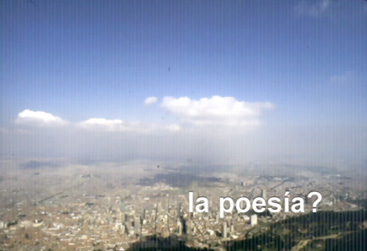
Born in 1948 in Santiago (CL)
Lives and works in New York (US)

1980
Video, colour, sound
durée : 23'
Year of Purchase: 2009
“Let me tell you this: politics and conflicts are doomed to disappear. That day, only Art, with capital A, will remain in this world.”1
What is poetry to you?
In 1980, the Chilean poet and artist Cecilia Vicuña paced up and down the streets of Bogotá, camera in hand, and asked residents, passers-by, and workers this very question. And for the time being it is an existential one. A strange form of cultural brainstorming conducted in a social body by means of sidewalk video, as an inversed cultural meditation in which the poet, for a moment, plays the public. It is both a militant and sensible way of questioning the soul of the capital—a direct approach to the actors of the city’s public spaces.
The “Great City” comes out dehumanized—a mental space and the theater of a culture transcending everything that is personal. Spontaneous, and sometimes surprising responses of the interviewed “people” (passers-by, children, beggars, prostitutes, policemen, slum inhabitants…), denote the richness of the orality of culture and of a culture of orality in Columbia.
Bogotá is a city long overrun by complex and widespread violence, but it lives a fairly normal daily life despite the uncertainty that this endemic disease entails. The climate of “barbarity” which today seems like a post-card2 existed on this scale already in 1980, at the moment when the film was shot.
One could think that “Poetry is elsewhere,” but Cecilia Vicuña contrasts this vision of Bogotá with an optimistic ethnopoetic approach that is paradoxically political and sentimental. Amidst the pervading violence, there are men and women. The artist confronts the city as an urban and human landscape, with the idea that poetry and the city are, above all, commonplaces. She chooses to stray away from places of culture, and towards individuals who are at the margins of dominant literature and culture where Poetry may seem a mythical object. She is on a quest for energy, memories, feelings, words, stories, rather than for universal mediations and other learned discourses of the profession. She wants to produce a resonance rather than a definition.
If we agree to define Poetry as an Art of Language, this concept leaves hanging the proteiform specificity which, as the films shows, changes with each encounter.
The film “works” on the same principle of gift exchange as a poem. The first response that Cecilia Vicuña’s film inspires in the viewer is: Que es para Usted la Poesía?, 1980. And since this work is a poem, and although a poem does an infinite number of things, it does not give an answer. Rather, it makes us think: Poetry is not a miracle; Poetry makes freedom of expression palpable; Poetry turns us into “men-books,”3 that is free men; Poetry is poetry… And humanity in each of us, that’s poetry, too.
It is up to us to formulate a response.
What is poetry to you?
Luc Jeand’heur
1 Kadokawa Haruki, Matsuo Shugo, Takahashi Yutaka, and Tanaka Yoshiki. Les Chroniques d’Arslân, 1994–95.
2 Columbia has the highest murder rate in the world.
3 Ray Bradbury, Fahrenheit 451, 1953